
Quake III Arena is a 1999 multiplayer-focused first-person shooter developed by id Software. The third installment of the Quake series, Arena differs from previous games by excluding a story-based single-player mode and focusing primarily on multiplayer gameplay. The single-player mode is played against computer-controlled bots. It features music composed by Sonic Mayhem and Front Line Assembly founder Bill Leeb.

Quake II is a 1997 first-person shooter video game developed by id Software and published by Activision. It is the second installment of the Quake series, following Quake.

Quake is a first-person shooter game developed by id Software and published by GT Interactive. The first game in the Quake series, it was originally released for MS-DOS, Microsoft Windows, and Linux in 1996, followed by Mac OS and Sega Saturn in 1997 and Nintendo 64 in 1998.
Video game modding is the process of alteration by players or fans of one or more aspects of a video game, such as how it looks or behaves, and is a sub-discipline of general modding. A set of modifications, commonly called a mod, may range from small changes and tweaks to complete overhauls, and can extend the replay value and interest of the game.

Grand Theft Auto: San Andreas is a 2004 action-adventure game developed by Rockstar North and published by Rockstar Games. It is the fifth main game in the Grand Theft Auto series, following 2002's Grand Theft Auto: Vice City, and the seventh entry overall. Set within the fictional U.S. state of San Andreas, the game follows Carl "CJ" Johnson, who returns home after his mother's murder and finds his old street gang has lost much of their territory. Over the course of the game, he attempts to rebuild the gang, clashes with corrupt authorities and powerful criminals, and gradually unravels the truth behind his mother's murder.

Payback is a video game developed and published by Apex Designs. It was first released in 2001. It was followed by a sequel in 2012, Payback 2.
Blockland is a sandbox game in which players build and play using Lego-like building blocks in singleplayer and multiplayer modes. It was created by American developer Eric "Badspot" Hartman, using the Torque Game Engine, and was originally released as freeware on November 15, 2004. The game is not endorsed by, or affiliated with, the Lego brand, but at one point, Lego was in talks with Hartman about purchasing the game. Blockland was spotlighted on The Screen Savers on February 11, 2005, drastically increasing the user base overnight. It has also been featured on Shack News. Blockland was officially released on February 24, 2007. It was released on Steam in December 2013 after spending nearly a year on Steam Greenlight.
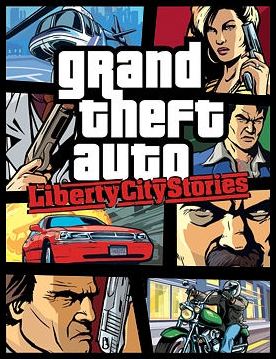
Grand Theft Auto: Liberty City Stories is a 2005 action-adventure game developed in a collaboration between Rockstar Leeds and Rockstar North, and published by Rockstar Games. The ninth installment in the Grand Theft Auto series, it was initially released as a PlayStation Portable exclusive in October 2005. A port for the PlayStation 2 was later released in June 2006. At the time of release, the recommended retail price of the PS2 port was around half the price of the PSP version, because the PS2 version does not feature the custom soundtrack ripping capability of the PSP version. Ports for iOS, Android and Fire OS devices were also released in December 2015, February 2016, and March 2016, respectively.
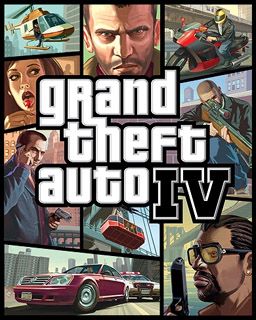
Grand Theft Auto IV is a 2008 action-adventure game developed by Rockstar North and published by Rockstar Games. It is the sixth main entry in the Grand Theft Auto series, following 2004's Grand Theft Auto: San Andreas, and the eleventh entry overall. Set in the fictional Liberty City, based on New York City, the single-player story follows Eastern European war veteran Niko Bellic and his attempts to escape his past while under pressure from high-profile criminals. The open world design lets players freely roam Liberty City, consisting of three main islands, and the neighbouring state of Alderney, which is based on New Jersey.

The Spring Engine is a game engine for real-time strategy (RTS) video games. The game engine is free and open-source software, subject to the terms of the GNU General Public License v2.0 or later.

Warhawk was a 2007 online multiplayer third-person shooter video game developed by Incognito Entertainment and published by Sony Computer Entertainment for the PlayStation 3. It was intended to be a remake of an aerial warfare game of the same name, which was an early title on the original PlayStation. It was the first PlayStation 3 game to be available both physically and digitally on the PlayStation Network.

AssaultCube, formerly ActionCube, is an open source first-person shooter video game, based on Cube and uses the same engine, the Cube Engine. Although the main focus of AssaultCube is multiplayer online gaming, a single-player mode consists of computer-controlled bots.

A sandbox game is a video game with a gameplay element that provides players a great degree of creativity to interact with, usually without any predetermined goal, or with a goal that the players set for themselves. Such games may lack any objective, and are sometimes referred to as non-games or software toys. More often, sandbox games result from these creative elements being incorporated into other genres and allowing for emergent gameplay. Sandbox games are often associated with an open world concept which gives the players freedom of movement and progression in the game's world. The term "sandbox" derives from the nature of a sandbox that lets people create nearly anything they want within it.
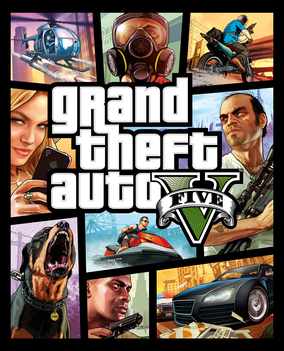
Grand Theft Auto V is a 2013 action-adventure game developed by Rockstar North and published by Rockstar Games. It is the seventh main entry in the Grand Theft Auto series, following 2008's Grand Theft Auto IV, and the fifteenth instalment overall. Set within the fictional state of San Andreas, based on Southern California, the single-player story follows three protagonists—retired bank robber Michael De Santa, street gangster Franklin Clinton, and drug dealer and gunrunner Trevor Philips, and their attempts to commit heists while under pressure from a corrupt government agency and powerful criminals. Players freely roam San Andreas's open world countryside and fictional city of Los Santos, based on Los Angeles.
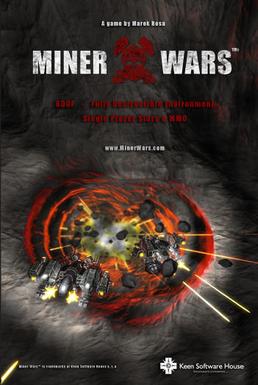
Miner Wars 2081 is a six degrees of freedom action-survival space-shooter simulation game produced by Keen Software House. The gameplay offers a choice of single player, co-op, and deathmatch multi-player. The game is set in the year 2081, 11 years after the destruction of all planetary objects in the Solar System. The story introduces the player to many types of missions: rescue, exploration, revenge, base defense, theft, transportation, stealth, search and destroy, pure harvesting or racing. A multiplayer spin-off game, Miner Wars Arena, was also released in 2012.

The Chromium Embedded Framework (CEF) is an open-source software framework for embedding a Chromium web browser within another application. This enables developers to add web browsing functionality to their application, as well as the ability to use HTML, CSS, and JavaScript to create the application's user interface.

A team of approximately 1,000 people developed Grand Theft Auto V over several years. Rockstar Games released the action-adventure game in September 2013 for PlayStation 3 and Xbox 360, in November 2014 for PlayStation 4 and Xbox One, in April 2015 for Windows, and in March 2022 for PlayStation 5 and Xbox Series X/S. The first main Grand Theft Auto series entry since Grand Theft Auto IV, its development was led by Rockstar North's core 360-person team, who collaborated with several other international Rockstar studios. The team considered the game a spiritual successor to many of their previous projects like Red Dead Redemption and Max Payne 3. After its unexpected announcement in 2011, the game was fervently promoted with press showings, cinematic trailers, viral marketing strategies and special editions. Its release date, though subject to several delays, was widely anticipated.
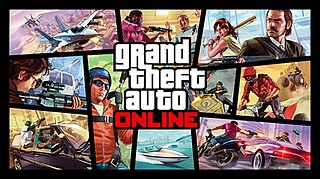
Grand Theft Auto Online is an online multiplayer action-adventure game developed by Rockstar North and published by Rockstar Games. It was released on 1 October 2013 for PlayStation 3 and Xbox 360, 18 November 2014 for PlayStation 4 and Xbox One, 14 April 2015 for Windows, and 15 March 2022 for PlayStation 5 and Xbox Series X/S. The game is the online component of Grand Theft Auto V. Set within the fictional state of San Andreas, Grand Theft Auto Online allows up to 30 players to explore its open world environment and engage in cooperative or competitive game modes.

User modification, or modding, of video games in the open world sandbox Grand Theft Auto series is a popular trend in the PC gaming community. These unofficial modifications are made by altering gameplay logic and asset files within a user's game installation, and can change the player's experience to varying degrees. Frequently created by anonymous modders, modifications are presented in the form of downloadable files or archives. Third-party software has been indispensable for building Grand Theft Auto mods, due to the lack of official editing tools from the developer, Rockstar Games. Mods for Grand Theft Auto are generally developed for use on the PC versions of the games, since the platform does not prevent modifications to installed software; however, similar content for console and mobile phone versions does exist to an extent.
Based on id Software's open stance towards game modifications, their Quake series became a popular subject for player mods beginning with Quake in 1996. Spurred by user-created hacked content on their previous games and the company's desire to encourage the hacker ethic, Id included dedicated modification tools into Quake, including the QuakeC programming language and a level editor. As a game that popularized online first-person shooter multiplayer, early games were team- and strategy-based and led to prominent mods like Team Fortress, whose developers were later hired by Valve to create a dedicated version for the company. Id's openness and modding tools led to a "Quake movie" community, which altered gameplay data to add camera angles in post-production, a practice that became known as machinima.




















